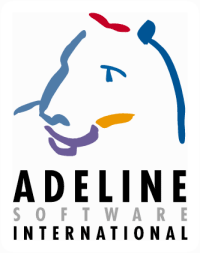
Sonic Adventure is a 1998 platform game for Sega's Dreamcast and the first main Sonic the Hedgehog game to feature 3D gameplay. The story follows Sonic the Hedgehog, Miles "Tails" Prower, Knuckles the Echidna, Amy Rose, Big the Cat, and E-102 Gamma in their quests to collect the seven Chaos Emeralds and stop series antagonist Doctor Robotnik from unleashing Chaos, an ancient evil. Controlling one of the six characters—each with their own special abilities—players explore a series of themed levels to progress through the story. Sonic Adventure retains many elements from prior Sonic games, such as power-ups and the ring-based health system. Outside the main game, players can play minigames like racing and interact with Chao, a virtual pet.

Treasure Co., Ltd. is a Japanese video game developer based in Tokyo known for its action, platform, and shoot 'em up games. The company was founded in 1992 by former Konami employees seeking to explore original game concepts and free themselves from Konami's reliance on sequels. Their first game, Gunstar Heroes (1993) on the Sega Genesis, was a critical success and established a creative and action-oriented design style that would continue to characterize their output. Treasure's philosophy in game development has always been to make games they enjoy, not necessarily those that have the greatest commercial viability.

Rare Limited is a British video game developer and a studio of Xbox Game Studios based in Twycross, Leicestershire. Rare are known for their games spanning many genres, which include platforming, first-person shooter, action-adventure, fighting, and racing. Some of their most popular titles include games from the Donkey Kong, Banjo-Kazooie, Viva Piñata, and Battletoads series, as well as games like GoldenEye 007 and Sea of Thieves.

Neversoft Entertainment was an American video game developer, founded in July 1994 by Joel Jewett, Mick West and Chris Ward. Neversoft was known for the Spider-Man video game as well as the Tony Hawk's and Guitar Hero video game franchises. The company was acquired by Activision in October 1999. Their last game was the Extinction mode of Call of Duty: Ghosts, and the studio merged with Infinity Ward, a primary developer on the Call of Duty franchise, on May 3, 2014 and was made defunct on July 10, 2014.
Rage Games was a British video game developer. Formed in Liverpool in 1992, its video games were marked by an emphasis on graphical effects with arcade gameplay.

Flashback, released as Flashback: The Quest for Identity in the United States, is a 1992 science fiction cinematic platform game developed by Delphine Software of France and published by U.S. Gold in the United States and Europe, and Sunsoft in Japan.

Little Big Adventure is a 1994 action-adventure game developed by Adeline Software International. It was published in Europe by Electronic Arts, and by Activision in North America, Asia and Oceania under the name Relentless: Twinsen's Adventure. Over 500,000 copies were sold by 1999. The game was initially released on CD-ROM and some time later on floppy disks; the CD-ROM version features full motion video, music and speech whereas the floppy disk version has MIDI music files and still images to replace the videos. The game was later ported to the PC-98 and FM Towns and was released in Japan in 1995. It was released for the PlayStation in Japan and Europe in 1996 and 1997 respectively, and to Android and iOS devices in 2014.
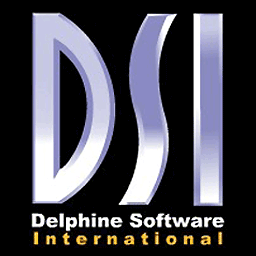
Delphine Software International was a French video game developer. They were famous for creating the cinematic platform games Another World and Flashback, which bore a similarity to Prince of Persia, both in gameplay and in its use of rotoscoped animation. They were also known for their Moto Racer series.

Little Big Adventure 2 is a 1997 adventure game developed by Adeline Software International and published by Electronic Arts.

Fade to Black is an action-adventure game developed by Delphine Software International and published by Electronic Arts Studios. It is the sequel to the 1992 video game Flashback. The game was released for MS-DOS with full Gouraud-shaded 3D graphics, and PlayStation with fully textured 3D. A version for the Dreamcast was released in 2018 by JoshProd, rebranded as Fade to Black: Flashback 2.
Nintendo Entertainment Analysis & Development Division, commonly abbreviated as Nintendo EAD and formerly known as Nintendo Research & Development No.4 Department, was formerly the largest software development division within the Japanese video game company Nintendo. It was preceded by the Creative Department, a team of designers with backgrounds in art responsible for many different tasks, to which Shigeru Miyamoto and Takashi Tezuka originally belonged. Both served as managers of the EARD studios and were credited in every game developed by the division, with varying degrees of involvement. Nintendo EAD was best known for its work on games in the Donkey Kong, Mario, The Legend of Zelda, F-Zero, Star Fox, Animal Crossing, Pikmin and Wii series.

Shaq Fu is a 2D fighting game released for the Sega Mega Drive / Genesis and Super Nintendo Entertainment System on October 28, 1994. It was ported to the Sega Game Gear, Nintendo Game Boy, and Commodore Amiga platforms in 1995. The game was published by Electronic Arts and developed by the now-defunct Delphine Software International. It features former professional basketball player Shaquille "Shaq" O'Neal as the player character.
Paul Cuisset is a French programmer and designer of several video games.
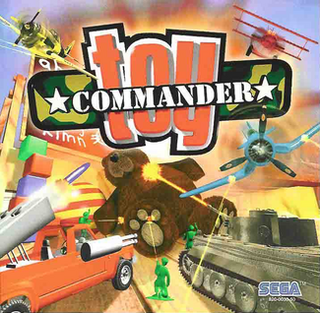
Toy Commander is an action game for the Dreamcast developed by No Cliché and published by Sega.

Conspiracy Entertainment is an American third-party developer video game publisher, publishing games from smaller companies that would face difficulties distributing games themselves. The company has also developed a few games of its own.
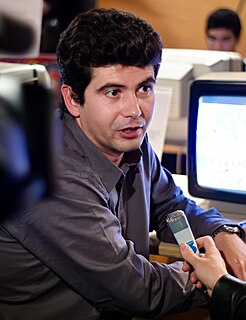
Frédérick Raynal[fʁedeʁik ʁɛnal] is a French video game designer and programmer, notable for his game developments in Infogrames, Adeline Software International and No Cliché. He is married to Yaël Barroz, a fellow game designer, with whom he has two children.
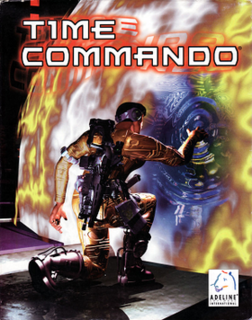
Time Commando is an action-adventure computer and video game developed by Adeline Software and published by Electronic Arts in Europe, Activision in America, and Virgin Interactive and Acclaim Entertainment in Japan.

Lobotomy Software, Inc. was an American video game developer which ported Quake and Duke Nukem 3D to the Sega Saturn and developed PowerSlave.

Moto Racer Advance is a motocross racing game developed by Adeline Software International, produced by Delphine Software International and published by Ubisoft for the Game Boy Advance. It was released in 2002 in PAL regions on October 4 and in North America on December 4. It is part of the Moto Racer series and was the last game to be developed by Adeline Software and also the last with any involvement from Delphine Software.
Raphaël Gesqua is a French composer, arranger and sound designer.
